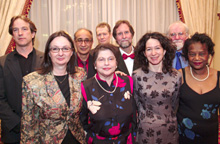Science College celebrates 25 rewarding years

At the back are David Mumby, acting principal; Ramesh Sharma, Fellow (Physics), Vesselin Petkov, LTA in Philosophy, Michael von Grünau, principal (on sabbatical), John McKay, fellow (Computer Science/Mathematics). In the front row, Diane Poulin-Dubois, fellow (Psychology), Acting Dean June Chaikelson, Natalie Phillips, fellow (Psychology), and Lillian Jackson, assistant to the principal, who organized the event.
Photo by Kate Hutchinson
Twenty-five years of encouraging young scientists can put a smile on your face, and there were plenty of those on March 12, when Concordia’s Science College held a dinner dance at the downtown Omni Hotel.
About 150 students, alumni, fellows and guests were on hand. The guests of honour included founding principal Elaine Newman, her successor, Geza Szamosi, and Acting Dean June Chaikelson.
The Science College, like the Liberal Arts College and the Simone de Beauvoir Institute, was established to create an intimate setting for like-minded students to meet one another, benefit from intensive mentoring, and do original work, even as undergraduates.
One of the Science College’s outstanding graduates was Majid Fotuhi, whose story is like something Hollywood might envy. As a teenager avoiding being drafted into the murderous Iran-Iraq war, Fatuji hid in the top floor of a factory.
"I filled the bathtub with old clothing and turned it into a bed," he recalled later. "I covered the toilet bowl with a piece of wood and made it into a small bookshelf. I studied English, French and German 14 hours a day, with the hope that one day I could pursue my education somewhere in the West."
He thought it would be only two or three weeks until he could get out of Iran, but it stretched into two years. He and a younger brother got to Canada on false passports, and were granted refugee status. Eventually, he was able to bring his other siblings here.
He enrolled at Concordia in 1983, and entered the Science College, becoming president of its student association and editor of the newsletter. Now he’s a neurologist at Johns Hopkins University, one of the leading medical centres in the U.S. He gave an invited lecture March 10 as part of the anniversary celebrations (see page 9).
Anita Brown-Johnson was in the first graduating class of the Science College. Now a physician, she is director of the Secondary Care Division of Family Medicine, and head of Transition Care Services for the McGill University Health Centre.
Paule Poulin spoke briefly at the dinner about her early days at the Science Centre. She marvelled at how in 1979, at her entrance interview, Dr. Newman was able to detect her ability through her then rudimentary English. Now she is doing groundbreaking work at the University of Alberta in stem cell research, devising new techniques for surgeons.
Alumnus Christopher Pearson is a physician, a CIH Research Scholar, and a Canadian Genetic Disease Network Scholar at the Hospital for Sick Children in Toronto. Another graduate, Michel Cóté, is a professor of physics at the Université de Montréal.
Not all the alumni of the Science College become working scientists, but they stillead fascinating lives. At the dinner last Saturday was Dominic Beliveau. He went to Japan, where he worked for five years for the government and learned Japanese well enough to speak it fluently. Now he’s back in Montreal, working for a pharmaceutical firm.
Also at the dinner was Ehab Abouheif, who grew up in Dorval. He has been all over the United States since he graduated. Now that he has his doctorate in evolutionary biology, he is an assistant professor at McGill.
Professor Newman told the dinner guests that she wanted to rededicate the Science College to its goal of pursuing research in an atmosphere of fellowship and idealism, and paid tribute especially to her successor, Geza Szamosi, who came from Ottawa with his wife to renew old frienships.
"The Science College currently has 79 students, most of them in biochemistry, biology and psychology. Twenty-three faculty members are associated with the College as fellows, from the Departments of Biology, Chemistry, Computer Science, Exercise Science, Mathematics, Physics and Psychology. The College sponsors lectures and workshops, many of them held in their quarters in the Richard J. Renaud Science Complex on the Loyola Campus."